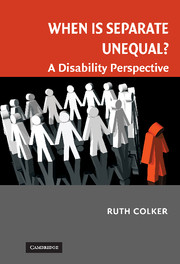Book contents
- Frontmatter
- Contents
- Preface
- Acknowledgments
- 1 Introduction
- 2 Anti-Subordination Above All: A Disability Perspective
- 3 The Mythic 43 Million Americans with Disabilities at the Workplace
- 4 K–12 Education
- 5 Higher Education and Testing Accommodations
- 6 Voting
- 7 Reflections on Race: The Limits of Formal Equality
- Index
2 - Anti-Subordination Above All: A Disability Perspective
Published online by Cambridge University Press: 05 June 2012
- Frontmatter
- Contents
- Preface
- Acknowledgments
- 1 Introduction
- 2 Anti-Subordination Above All: A Disability Perspective
- 3 The Mythic 43 Million Americans with Disabilities at the Workplace
- 4 K–12 Education
- 5 Higher Education and Testing Accommodations
- 6 Voting
- 7 Reflections on Race: The Limits of Formal Equality
- Index
Summary
The field of disability discrimination is undertheorized; it conflates “separate” and “unequal.” Theories of justice typically do not consider the example of disability or, if they do, proceed from a pure “integrationist” perspective. Although an integrationist perspective played an important historical and structural role in helping to close some horrendous disability-only institutions, it fails to recognize that the government may need to retain some disability-only services and institutions for those who need or want them while protecting others from coercively being required to accept such services or being placed in such institutions. An absolutist integrationist perspective disserves the disability community by supporting an inappropriately high threshold for the development and retention of disability-only services and institutions. An anti-subordination perspective should replace it.
Well-known equality theorists have incompletely considered the example of disability discrimination. John Rawls's theory of justice, for example, presumes that society consists of “free and equal persons … who can play the role of fully cooperating members.” Douglas Rae mentions individuals with disabilities in passing as part of his “need-based person-regarding” equality, but his discussion of disability is degrading with passages such as “Perhaps, no services could make a crippled child as happy as her healthy friends, but her special needs may nonetheless require special services equal to and different from those of her playmates.” Martha Nussbaum's work is an important exception to this pattern, but her “capabilities approach” is flawed because her focus on ten functional abilities as a prerequisite to being truly human “excludes some individuals with intellectual disabilities, and only indirectly assists others.”
- Type
- Chapter
- Information
- When is Separate Unequal?A Disability Perspective, pp. 10 - 38Publisher: Cambridge University PressPrint publication year: 2008



